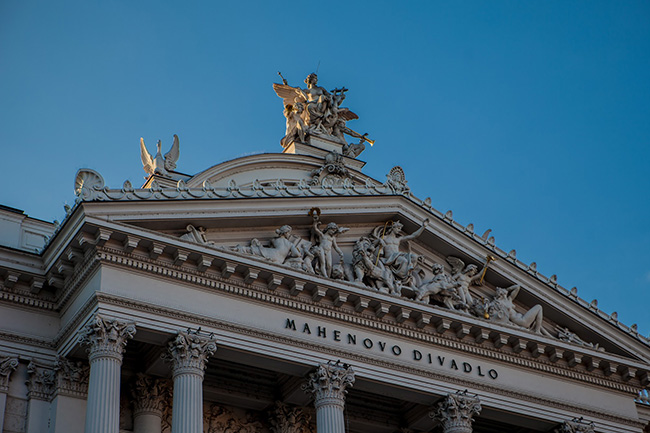
-
Synopsis
Act 1
The colonnade walk in Luhačovice
At the centre of attention of many spa town of guests is the opet Dr. Suda with his friends, Konečný, and Lhotský, and the young lady Míla. A new guest arrives, the composer Živný. The groupe is surprised to find that Živný and Míla have met before. New people appear on the scene: the singing teacher Miss Stuhlá and young people who are looking forward to a scout excursion with Dr. Suda. The company leaves, and only the composer Živný and Míla stay behind. Their previous love affair was put to an end by Míla´s mother, for whom the prospect of her daughter living with a composer was comparable to a beggar´s existence. Živný had been composing an opera about his unfortunate fate ever since. Only now did he find that he had wrongly suspected Míla of infidelity: her son Doubek is actually his son. The two lovers agree that they will live together, Míla´s mother notwithstanding.
Act 2
The married couple´s apartment
Živný sings excerpts from his opera. He must now delete those parts in which he was unjustly accusing Míla. Young Doubek asks his mother whether she knows what love is. Míla knows this far too well – love and the whole of her life are ruled by Fate, Fatum. Life with Míla´s mother is becoming hell. The mother´s insanity is increasing: she is forced to live under one roof with a man who, in her opinion, is interested only in her money. Živný appears her like a wicked raven. She wants to fly away from him, but falls off the balcony and drags Míla with her. Živný is in despair about his wife´s death. He invites thunderbolts to strike at his wretched fate.
Act 3
The assembly hall of the conservatoire
Students are singing from the score of the new opera written by their Professor Živný. The work is to have its premiere in the theatre that evening, but the last act is still missing. The students ask their teacher to tell them something about his strange opera. With great animation, Živný speaks about the origin of the piece and the surprised students realize that the content of the opera is in fact very life story. Živný´s narration gets close to the point of Míla´s death… when suddenly thunderbolts of a rel strom can be seen. Živný collapses. The end of his opera remain unfinished and in the hands of God, much as Živný´s fate.
The National Moravian-Silesian Theatre is one of the Janáček festival’s regular guests, which is fitting: after all, it is based in Janáček´s native region. At this festival, it will present a completely new production of the somewhat infrequently performed opera Destiny, directed by its manager Jiří Nekvasil and with music prepared by music director Jakub Klecker.
Janáček´s fourth opera, Destiny, was created in a period which wasn´t easy for the composer. In February 1903 his beloved daughter Olga died, and one month later, after almost ten years of effort, he finished the opera Jenůfa, which the National Theatre in Prague immediately refused to perform. In August 1903, Janáček left for his beloved Luhačovice for three weeks and there met charming twenty-eight-year-old Kamila Urválková, the wife of a forest manager in Zahájí and a previous love of composer and conductor Ludvík Čelanský. Kamila told Janáček about her romantic relationship with Čelanský; not only had it been unsuccessful, but also Čelanský had expressed his disillusionment in the opera Kamila, where he presents the main character as an unstable and immature personality. Janáček, who was charmed by Kamila, decided to create a “completely new, modern opera” in which her reputation would be cleansed. After his return from Luhačovice, he made an intensive search for a suitable librettist capable of processing his ideas. In the end, he asked Fedora Bartošová, a young teacher who had been his deceased daughter Olga’s friend. Janáček prepared the exact scenario of the opera himself, with a story and environment that makes it a completely different work from his previous operas. The first tones of an orchestral waltz take us into a world inhabited by the refined members of spa-going society; for their speech, Janáček asked the librettist to write verses in the style of decadent poets. The story gradually unveils via the dialogue of the main characters, Živný, who is a composer, and Míla. Just as in his other operas, Janáček made great use of his recordings of human speech. Despite its undeniable musical qualities, Janáček didn´t live long enough to see Destiny performed. He wanted the premiere of the work, which was originally assigned to the Brno theatre, to occur at the Vinohrady Theatre in Prague, but after many promises and delays, it didn´t take place. It was only in 1934 that Janáček´s pupil Břetislav Bakala prepared its radio performance and in 1954 also a concert version. Destiny was finally performed on stage in Brno for the first time on 25th October 1958, in an adaptation by Václav Nosek.
Jiří Zahrádka

